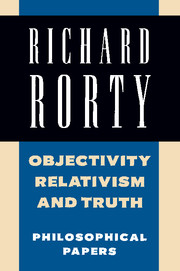Book contents
- Frontmatter
- Contents
- Acknowledgments
- Introduction: Antirepresentationalism, ethnocentrism, and liberalism
- Part I
- Part II
- PART III
- The priority of democracy to philosophy
- Postmodernist bourgeois liberalism
- On ethnocentrism: A reply to Clifford Geertz
- Cosmopolitanism without emancipation: A response to Jean-François Lyotard
- Index of names
Postmodernist bourgeois liberalism
Published online by Cambridge University Press: 05 June 2012
- Frontmatter
- Contents
- Acknowledgments
- Introduction: Antirepresentationalism, ethnocentrism, and liberalism
- Part I
- Part II
- PART III
- The priority of democracy to philosophy
- Postmodernist bourgeois liberalism
- On ethnocentrism: A reply to Clifford Geertz
- Cosmopolitanism without emancipation: A response to Jean-François Lyotard
- Index of names
Summary
Complaints about the social irresponsibility of the intellectuals typically concern the intellectual's tendency to marginalize herself, to move out from one community by interior identification of herself with some other community – for example, another country or historical period, an invisible college, or some alienated subgroup within the larger community. Such marginalization is, however, common to intellectuals and to miners. In the early days of the United Mine Workers its members rightly put no faith in the surrounding legal and political institutions and were loyal only to each other. In this respect they resembled the literary and artistic avant-garde between the wars.
It is not clear that those who thus marginalize themselves can be criticized for social irresponsibility. One cannot be irresponsible toward a community of which one does not think of oneself as a member. Otherwise runaway slaves and tunnelers under the Berlin Wall would be irresponsible. If such criticism were to make sense there would have to be a supercommunity one had to identify with – humanity as such. Then one could appeal to the needs of that community when breaking with one's family or tribe or nation, and such groups could appeal to the same thing when criticizing the irresponsibility of those who break away. Some people believe that there is such a community. These are the people who think there are such things as intrinsic human dignity, intrinsic human rights, and an ahistorical distinction between the demands of morality and those of prudence.
- Type
- Chapter
- Information
- Objectivity, Relativism, and TruthPhilosophical Papers, pp. 197 - 202Publisher: Cambridge University PressPrint publication year: 1990
- 3
- Cited by



